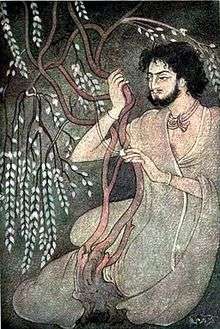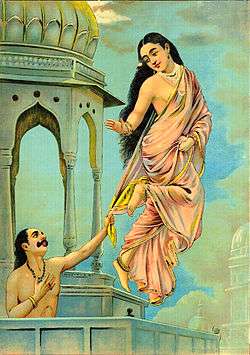Pururavas
Pururavas (Sanskrit: पुरूरवस्, Purūravas) was the first king of the Aila dynasty or the chandravamsha. According to the Vedas, he is a Hindu legendary entity associated with Surya (the sun) and Usha (the dawn), and is believed to reside in the middle region of the cosmos. The Rig Veda (X.95.18) states that he was a son of Ilā[1] and was a pious king. However, the Mahabharata states that Ila was both his mother and his father. According to the Vishnu Purana, his father was Budha, and he was ancestor of the tribe of Pururavas, from whom descended the Kauravas and Pandavas of Mahābhārata.
| Pururavas | |
|---|---|
 Purūravas in sadness | |
| In-universe information | |
| Family | Ilā (mother), Budha (father) |
Narrative of Urvashi and Purūravas

The earlier version of the narrative of Urvashi and Pururavas is found in the Rigveda (X.95.1–18) and the Śatapaṭha Brāhmaṇa (XI.5.1). The later versions are found in the Mahābhārata, the Harivaṃsa, the Viṣṇu Purāṇa, the Matsya Purāṇa,[2] and the Bhāgavata Purāṇa.
In Vedic literature
The Ṛg-veda, X.129 contains a conversational fragment, written in a highly wrought poetic style. The hymn suggests that Uṣas (also known as Urvaśi) is a Gandharvi or Apsara (an aquatic nymph). Having been united with a human king, Purūravas, and after living together for four autumns, suddenly left him on his unintentional violation of the stipulated conditions of the union. Later Purūravas made futile entreaties to her to return to him.[2]
The narrative displays multiple levels of symbolism by playing on the multiplicity of meanings in the Vedic Saṃskṛt terms. While it is a love poem, expressing the conflict of interest between a lover and his beloved, who spurns his love, it also expresses the immortal relationship between the Sun (Purūravas) and the Dawn (Uṣas). In addition to these two levels of meaning, it also offers mantric prescriptions for a ritual activity bent on taking rebirth as a Gandharva or Apsaras.
In classical Sanskrit literature
The love story of king Pururavas and celestial nymph Urvashi is found in the Sanskrit drama, Vikramōrvaśīyam, written by the celebrated poet Kalidasa.
Life and descendants
Birth
Pururavas was born in Treta Yuga as the son of Budha and Ila. Budha was the son of Chandra, the moon god and thus Pururavas was the first Chandravanshi King. Since he was born on Mount Puru, he was called Pururavas.
Life
According to the Puranas, Pururavas reigned from Pratisthana (Prayag[3]). He performed a penance to Lord Brahma and as a reward, he was made the sovereign of the whole earth. Pururavas celebrated a hundred Ashwamedha Yajnas. The Asuras were his followers while, the Devas were his friends. He had six (or seven or eight according to different accounts) sons. The names of these sons are: Ayu (or Ayus), Amavasu,[4] Vishvayu, Shrutayu, Shatayu (or Satayu), and Dridhayu. Nahusha, the son of Ayu, is a well-known name in the Rigveda.[5]
Notes
- Misra, V.S. (2007). Ancient Indian Dynasties, Mumbai: Bharatiya Vidya Bhavan, ISBN 81-7276-413-8, p.57
- Dandekar, R.N. (1962). Indian Mythology in S. Radhakrishnan ed. The Cultural Heritage of India, Calcutta: The Ramakrishna Mission Institute of Culture, ISBN 81-85843-03-1, pp.229–30, 230ff
- Wilson, H.H. (1840). The Vishnu Purana, Book IV, Chapter I, footnote 7.
- Pargiter, F.E. (1972). Ancient Indian Historical Tradition, Delhi: Motilal Banarsidass, pp.85–6.
- Misra, V.S. (2007). Ancient Indian Dynasties, Mumbai: Bharatiya Vidya Bhavan, ISBN 81-7276-413-8, pp.59–61
References
- A Dictionary of Hindu Mythology & Religion by John Dowson
- Gaur, R. C. “The Legend of Purūravas and Urvaśī: An Interpretation.” Journal of the Royal Asiatic Society of Great Britain and Ireland, no. 2, 1974, pp. 142–152. JSTOR, www.jstor.org/stable/25203565. Accessed 27 Apr. 2020.
- Wright, J. C. “Purūravas and Urvaśī.” Bulletin of the School of Oriental and African Studies, University of London, vol. 30, no. 3, 1967, pp. 526–547. JSTOR, www.jstor.org/stable/612386. Accessed 27 Apr. 2020.
- "‘Cupid, Psyche, and the “Sun-Frog”’, Custom and Myth: (London: Longmans, Green and Co., 1884)." In The Edinburgh Critical Edition of the Selected Writings of Andrew Lang, Volume 1: Anthropology, Fairy Tale, Folklore, The Origins of Religion, Psychical Research, edited by Teverson Andrew, Warwick Alexandra, and Wilson Leigh, 66-78. Edinburgh: Edinburgh University Press, 2015. Accessed June 6, 2020. www.jstor.org/stable/10.3366/j.ctt16r0jdk.9.
